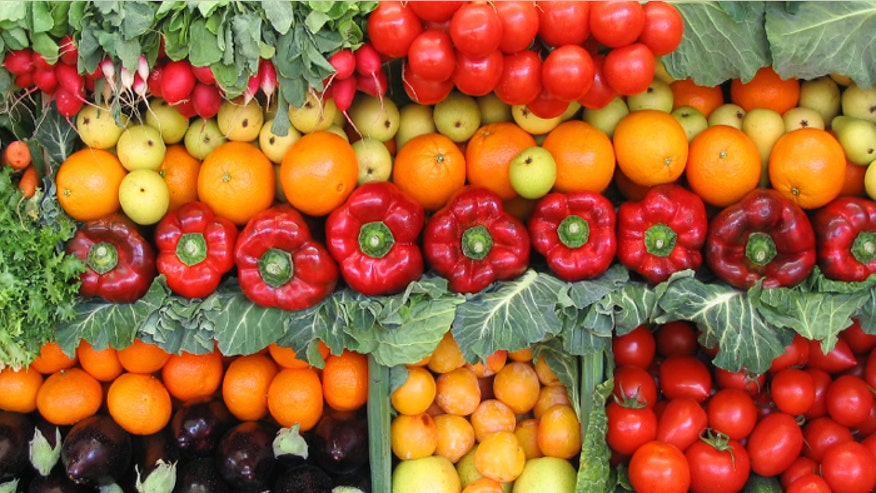
Organic food is controversial, mostly because food is political. People like me who choose to eat organic produce and other foods grown and raised without poisons, carcinogens, heavy metals, other harmful toxic chemicals, and genetically engineered food are constantly forced to defend ourselves.
Happily, doing so just got easier. A recent review of 343 studies published in the British Journal of Nutrition found that organic foods are more healthful than conventional foods, mainly because the former contain higher concentrations of antioxidants, while the latter contain higher levels of the toxic metal cadmium.
What’s so special about antioxidants? According to the U.S. National Institutes of Health (NIH), antioxidants are man-made or natural substances that can prevent or delay cell damage, which lowers the risk of certain diseases. Fruits and vegetables are rich sources of antioxidants, but organic fruits and vegetables are especially filled with these helpful molecules.
Primarily, antioxidants combat free radicals, which can cause “oxidative stress” – a process that may play a role in the development of cancer, cardiovascular disease, diabetes, Alzheimer’s, Parkinson’s, and other conditions, according to the National Center for Complementary and Alternative Medicine. Some of the best food sources for antioxidants include fruits and vegetables rich in vitamin C (strawberries, broccoli, kale), vitamin E (nuts, spinach, canola oil), beta carotene (carrots, sweet potatoes, peas), and lycopene (watermelon, pink grapefruit, tomatoes).
On the flip side, what’s so bad about cadmium? First of all, it’s present in cigarette smoke. If that’s not enough, chronic inhalation or oral exposure to cadmium can cause kidney disease, according to the U.S. Environmental Protection Agency (EPA). On its website, the EPA notes that for non-smokers, food is the largest source of cadmium exposure and that cadmium levels in foods can be increased by the use of fertilizers or sewage sludge on farm fields. The EPA considers cadmium a probable human carcinogen, and yet it pervades our food supply.
Dr. Charles Benbrook, co-author of the recent study, said that buying organic is “the surest way of limiting exposure” to toxins, but people should increase their intake of fruits and vegetables regardless of how they are grown. Yet should they do so with a guilty conscience? That conventionally grown strawberry might not taste so good with the knowledge that it is nutritionally inferior.
We know that organic foods are healthier, and we know why. Yet toxic pesticides, insecticides, fertilizers, fungicides and other dangerous farming practices persist – unnecessarily, in my opinion. One of the reasons scientists think organic fruits and vegetables are higher in antioxidants is precisely because they produce more of these substances to ward off insects and other environmental threats. They adapt to their surroundings naturally rather than artificially, kind of like humans. Left to their own devices, it turns out fruits and vegetables are pretty darn smart.
Defenders of conventionally grown crops have argued that any pesticide residues found on their products are too small to pose a health risk. This is probably true if you eat just one carrot or just one pepper. But what about all the many carrots and peppers eaten over a lifetime? We know little to nothing about the long-term effects of sustained exposure to small amounts of pesticide residue, or the health consequences of eating genetically modified and engineered foods. I’m not interested in being a test dummy, and you shouldn’t be either.
Here’s what we do know: Pesticide residues have an accumulative affect. Beginning in the womb, our many chemical exposures stay with us throughout our lives, according to the Pesticide Action Network North America. This is our chemical body burden. We are exposed to such substances not just in dirty food, but also in dirty air, water and soil, largely because of the toxins sprayed and applied on our farms.
Plus, the people routinely applying these toxins – farmworkers – suffer more chemical-related injuries and illnesses than any other workers in the nation, as the nonprofit organization Farmworker Justice notes on its website. These conditions include dizziness, nausea, headaches, breathing difficulty, cancer and reproductive problems, to name just a few. Anyone claiming low-level exposure to pesticides is perfectly safe should tell this to a sick farmworker.
In my opinion, we should all be buying and growing organic fruits, vegetables, grains, nuts, and herbs. If anyone asks you why, explain proudly. Support organic farmers. Repeat as necessary.
Note: Information provided herein is not intended to treat or diagnose any health condition. As always, consult your healthcare provider with any questions or health concerns.
Deirdre Imus, Founder of the site devoted to environmental health, www.ImusEnvironmentalHealth.org, is President and Founder of The Deirdre Imus Environmental Health Center® at Hackensack University Medical Center and Co-Founder/Co-Director of the Imus Cattle Ranch for Kids with Cancer. She is a New York Times best-selling author and a frequent contributor to FoxNewsHealth.com, and Fox Business Channel. Check out her website at www.ImusEnvironmentalHealth.org and ‘Like’ her Facebook page here.

